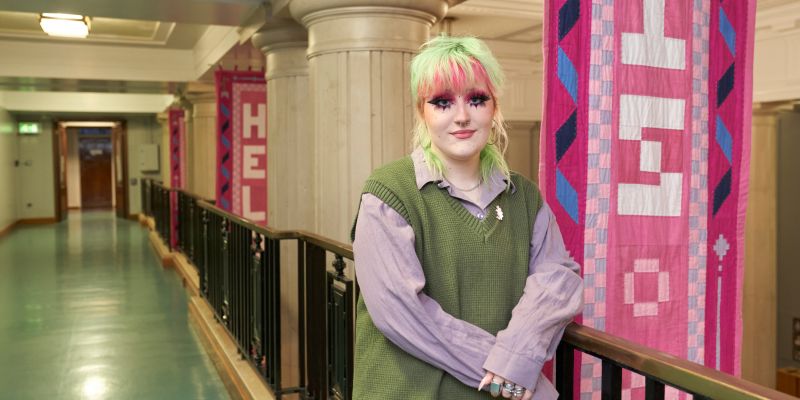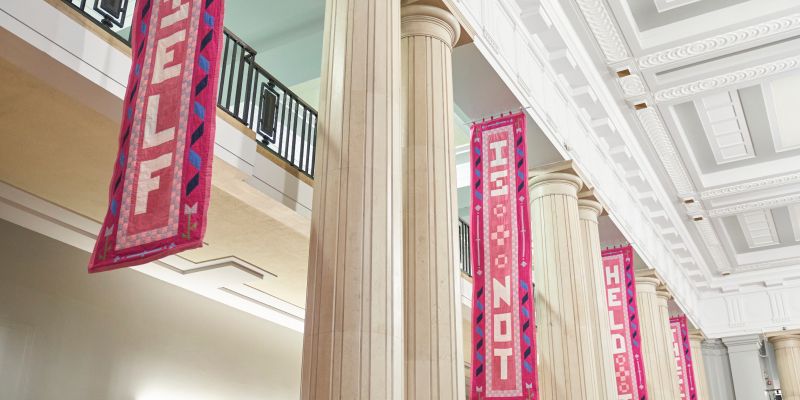
A new large-scale textile artwork for Parkinson Court created by artist, quiltmaker and Leeds alum Tiegan Handley (Fine Art 2023) provides the perfect gateway to the Contested Bodies exhibition.
Located in the University’s Stanley & Audrey Burton Gallery, Contested Bodies delves into the work of over 40 contemporary artists from across the gender spectrum. Tiegan’s piece is inspired by feminist and other protest banners – and is particularly concerned with the disconnection felt by the artist between their gender identity and their body.
Both Tiegan’s work and the exhibition reinforce the University’s commitment towards a future where no person should experience injustice or discrimination on grounds of their sexuality or gender orientation. It comes as the University announced an ambitious new fundraising initiative to become the world leader in LGBT+ research.
‘My self is not held in this flesh’
Tiegan was comissioned by the University to design the banners to sit alongside the Contested Bodies exhibition, which explores gender stereotypes and self-representation. The banners read ‘my self is not held in this flesh’ – and have subsequently been purchased by the University.
“It’s really representative of the disconnect and challenges I feel in relating my brain to my body,” Tiegan said. “I don’t have much connection with my physical self.”
Tiegan’s work is characterised by an exploration of the boundaries and blurred lines of their own gender identity and queerness using language and quiltmaking. Whilst studying at Leeds, their research into gender studies, the history of feminism and the long history of quilters and quiltmaking was a turning point in their practice. “So to hang my own version of the transgender pride flag in a university building is my absolute pleasure.”

The production of the piece required Tiegan to work with their hands, mainly in sewing or machine sewing using second hand fabric, following the historic traditions of quiltmaking. “Due to the size of my work, the making process is very physically involved which means I can explore all directions of interest within a project or piece of work.
“Making the piece into a physical body is a bit like therapy. It allows me to explore the relationship between my gender and my body, which forced me to consider the disconnect between the self and the flesh – hence the phrase ‘my self is not held in this flesh’.”
For Tiegan, queer, trans, and gender non-conforming textile artists provide inspiration and community. Tiegan’s work is reflective of the themes of the Contested Bodies exhibition – which challenges ideas around race, class, objectification, pleasure or desire, with an understanding that gender is socially constructed and performed. It is a space where each artist has the freedom and power to perform gender in a way that feels right to them.
“As the complexities of the world continue to expand around the policing of gender and certain bodies, this exhibition could not have come at a more opportune time,” said exhibition co-curator Marcelle Joseph. “I am thrilled to lend the works in this exhibition to the ever-dynamic Stanley & Audrey Burton Gallery, especially given Leeds’ rich history of feminist and queer activism. The artists here instruct us towards new ways of understanding gender and recognising humanity outside of exclusionary heteronormative binaries.”
Artists include Jonathan Baldock, Jesse Darling, Martine Gutierrez, Sin Wai Kin, Jala Wahid, Alberta Whittle, Gray Wielebinski and Zadie Xa.
Pride at Leeds
The exhibition coincides with the recent launch of a major fundraising project for Leeds to become the world leader in LGBT+ research. With donor support, the University aims to address critical issues faced by LGBT+ people – a commitment which extends far beyond campus, to reach LGBT+ people across the UK and around the world.
As well as questions of legality, LGBT+ people face issues of discrimination and violence – from name-calling and harassment to being denied employment or healthcare. Pride Scholarships will enable postgraduate researchers to bring together rigorous evidence-based research, advocacy and leadership to better understand and address these critical issues.